Peter MALONE
Open Grave
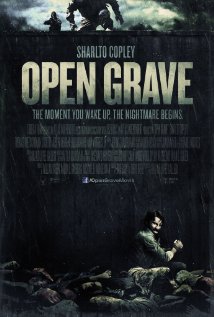
OPEN GRAVE
US, 2013, 102 minutes, Colour.
Sharlto Copley, Thomas Kretchmann, Josie Ho, Joseph Morgan, Erin Richards, Max Wrottesley.
Directed by Gonzalez Lopez Gallego.
Open Grave is quite an effective horror-thriller. It is in the genre of apocalyptic infection-play dramas.
It begins with a focus on a single man, finding himself awaking in pit of human bodies, and finishing with an aerial shot of the vast pit with so many bodies.
The man has lost his memory, is helped out of the pit by an Asian woman who is mute but wants to help, later revealed to be immune from the infection. He goes to a house where he finds a group who have also lost their memories, even though their identity lie cards on the table. His is not and they are suspicious.
As the plot unfolds, each begins to regain touches of memory, with some visual flashbacks of an eerie nature. Some go out in a car to search finding some cages, some isolation tents, a young boy, and various demented aggressive men and women.
With gradual memories, the initial man begins to remember and wonders who he is, whether he has done damage to the other people are not. That all waiting for the next day, the 18th where some people will gather. As it turns out, the man is actually a doctor who was coming with the others, a squad, to help those infected, and one of those is the aggressive man amongst the group, who it is revealed, is a local inhabitant and infected.
The 18th comes with military rescue, but they attack some of the group fatally. To escape, the doctor injects himself once again and goes into the pit of dead bodies.
Sharlto Copley (District 9) is the doctor, and international star, Thomas Kretschmann, is a locally infected man. The director is Gonzalez Lopez Gallego. After directing in Spain, he made the space-fiction, Apollo 18.
1. A post apocalypse story? Plague, infection, possibilities for cure? Not?
2. The title, the opening, John and his discovering himself in the grave, the bodies? The ending and the vast open grave?
3. Intensity of the story, the narrow focus, the images, the story and opening up, the vast grave – and the future?
4. John getting out, going to the house, finding the group, his lack of memory, identity, their identity cards on the table? The nature of the mystery? The group and suspicions? Characters, Michael and Nathan? Sharon? Lukas? No memories?
5. Lukas and his hostility? Sharon more conciliatory? Michael friendly? Nathan? The significance of the mutant girl, Asian, not having the language, not able to communicate? Yet her helping?
6. The attempted venturing out, the woods, the farm, the zombies and fear? The guns? Suspicions, glimpses of memory, names? The cages, the emergency tents in the medical set-up, the fearful boy?
7. John seeming the villain, not knowing whether he was not, referring to Nate?
8. The return of memories, the effect? Michael, venturing out, his death?
9. The identities, Lukas as a local farmer, being infected, his headaches, the worst infection? Sharon, Michael and Nate, part of the team? Nate and his
death?
10. The expect day, the arrival of the troops, firing on people, deaths?
11. John, finding the goods, the injections, the stock? The truth about the mission to help people? The infection?
12. John, saved, injecting himself, losing his memory, finding himself once again in the open grave?
Species
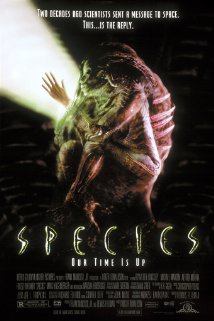
SPECIES
US, 1995, 108 minutes, Colour.
Ben Kingsley, Michael Madsen, Alfred Molina, Forest Whitaker, Marg Helgenberger, Natasha Henstridge, Michelle Williams.
Directed by Roger Donaldson.
Species has scientists going beyond limits, this time creating a monster from DNA from an alien. The alien grows rapidly into an attractive female determined to mate and reproduce. The scientists spend the film pursuing her to destroy her.
So, it is related to the Aliens series. It has its scary moments, but it is more of an action chase movie. The strong cast makes the pursuers more interesting than usual and the screenplay has more wit than the more slambang versions of this kind of science-fiction.
The plot and treatment are for adults rather than merely matinee material. Chase the alien!
1. Science fiction of the 1990s? Looking back to the past, stories of alien contacts, close encounters, Roswell?
2. The blend of science-fiction with touches of horror? Pursuing a monster? Blood and gore?
3. The reputation of the director, the strong cast?
4. The title, the focus on the creature, information about messages from space, the answers, DNA, combination with human DNA, the production of the creature?
5. The girl in the cage, audience sympathy, Fitch watching her, his decision, the cyanide, the effect, her getting out, running away, over the fence, to the railway yards, onto the train, the beginning of her killings? The food, getting the cash, the guard and her kindness, destroying her? The rapid growth? The food, the effect on her metabolism? The appearance of the tentacles, the cocoon in the carriage?
6. The team, gathered together, Fitch in charge, Press as a hunter, ruthless? Laura, science background? Stephen, lecturer, issues of culture? Dan, his insights, the seer, detecting emotions? The interaction?
7. Forming a team, Fitch and his explanations, motivations, the detective work, going to the train and seeing the destruction, going to the club, to the house of the man took Sil home? The next house and the pool, the dead body? Going underground? The worker killed, the chase, the finale in the sewers, the successive deaths?
8. Sil as child, rapid growth into an adult, her beauty, going to the hotel, charming people, the credit card? Buying the dress in the shop, wearing it? Going to the club, flirting? Picking up the man, going home? Her urge to mate, to become pregnant? The attempted sex, his saying no, Sil resisting, his being diabetic and taking the insulin, killing him? Taking the car, the terrified woman and her being tied up, crashing into the pole? The man helping at the hospital, paying the bill, taking her home, taking the photo, in the pool, her aggressiveness, his resistance, his being killed? Going into the sewers, killing the guard?
9. The hotel, Laura and Press getting on well and the sexual encounter, Stephen and his staying in the bar, going to his room, Sil and her being in the corridor, her disguise with her hair? The sexual encounter, her becoming pregnant? Killing him?
10. The sewers, the birth of the child, the little boy, the group and the chase, the flamethrower, Fitch and his being killed, Dan and the child, the gun, hanging on, the monster grabbing him, his death? Press and Laura and surviving?
11. The scenario of the pregnancy, giving birth, the boy, the potential for more eggs and creatures, domination?
11.6
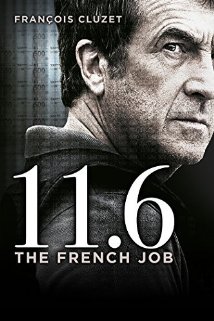
11.6
France, 2013, 102 minutes, Colour.
François Cluzet, Bouli Lanners.
Directed by Philippe Godeau.
A true story. 11.6 is the number of millions of euros taken by truck driver, Toni Muselin. He worked for a security firm transporting cash and payrolls. He was a very ordinary citizen, who worked for the company 10 years. He was married and his wife ran a restaurant. His main friend was a co-driver.
The screenplay shows his grudges against the boss, made to work on public holidays, refusing him time to go to a funeral. He also spends his money on luxury car which he enjoys driving.
One day, the men get out of the truck leaving Toni alone, and he makes a decision to drive away with the cash, hiding it in a storage room, riding off on a motorbike – but, to what purpose except the getting of revenge on his boss. He then gives himself up to the police and serves a jail sentence.
Prominent French actor, François Cluzet is at home in the central role.
1. A true story? French story? Universal interest?
2. The title, the amount of money taken? Hidden? Not found?
3. The French locations, the business world, the restaurant, the trucks, security, the cash? The musical score?
4. Toni in himself, his wife, working at the restaurant, their relationship?
5. Work, the group, co-drivers? Security? The team? His partner? The boss, no time at the funeral? his having a grudge? Having to take on extra jobs
during holidays?
6. Buying the luxury car, cash, loans, his exhilaration in driving it, with his wife, proprietorial?
7. The situation, the truck, the men outside the truck, his decision, driving away?
8. Away, alone, his life and style, the money? His motorbike, in the helps? In motivation and getting revenge on his boss?
9. The opening and his decision to give himself up, the flashbacks, his story, the sentence, in jail?
Species 2
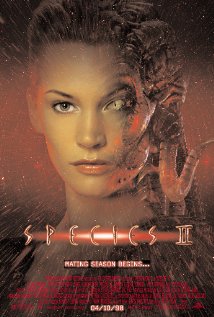
SPECIES II
US, 1998, 102 minutes, Colour.
Michael Madsen, Natasha Henstridge, Marg Helgenberger, Mykelti Williamson, Justin Lazard, James Cromwell, Peter Boyle, George Dzundza.
Directed by Peter Medak.
Species did a surprising amount of business around the world in 1995. This time around, in Species II, an expedition to Mars unwittingly brings back contaminated soil which contains DNA from an ancient, vicious galactic species. It infects the astronauts. Meanwhile scientists have created a half-human, half-species creature to study. You can more or less guess the rest but that's not the point. It's experiencing the action and horror that counts. Sometimes grizzly, sometimes sexual, this is one of those movies that wonders 'what if...?'. It's solely for the fans of this kind of thing. Science, aliens and ooze.
1. Science fiction from the 1990s? Images of horror?
2. Presupposing the original film, situations, characters, theories about aliens, aliens mating, destroying humans?
3. Classic, the credits, the voyage to Mars? Arriving, walking on the planet, the collection of soil, the smoke suggestion of aliens? The American control? The achievement, the return, the missing seven minutes? Television in the commentary?
4. Pat Ross, Campbell, Ann? The working together? The achievement, walking on Mars, the return? The medical checkups, 10 days, the sexual relationships? The Darlington, pads father and his speech?, The present, the sexual encounters, his speech, seen as a hero?
5. The Dr, investigations, the blood tests, his discoveries, phone call to the scientist interned in the institution, his death?
6. The scientists and the institution, is calling them not to go to Mars, is being interviewed by press and Laura, his explanations?
7. Laura, the facility, creating Eve? Is the upper-class cage, the memories of capsule, the discussions, eve wanting to get out, watching TV, her being monitored, responses to connection with Patrick?
8. , Going to his father, his concern, his father putting him down, saying he would be President? The sexual experiences, the design plans to meet and produced children? Destroying the women? Taking the children to the shed? The number of children?
9. The general, the destruction of his, his type stances, military demands? His calling press? The tests on Campbell, his being, yet his being a carrier illness? The general and his confronting Matthew Ross?
10. Matthew Ross, going to the shed, the confrontation by the general, the truth about his son, his wanting to listen to him, his son?
11. Eve, her personality, agreeing to the test? Her contact with Ross? Providing information, his locations? Ross in the supermarket, the cars? His escape?
12. Eve, her confinement, getting out through the glass, the group following her, given that the shed?
13. Investigation the shed, the cocoons, spraying them with the poison, Press and his pursuit of Ross, Ross is a monster, the fight club? The? Death?
14. Thinking that all was finished? The site of the young child in the car?
Homesman, The
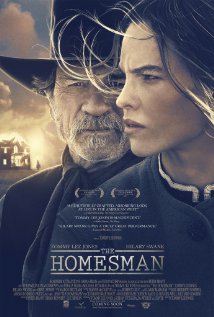
THE HOMESMAN
US, 2014, 122 minutes, Colour.
Hilary Swank, Tommy Lee Jones, Grace Gummer, Miranda Otto, Barry Corbin, David Dencik, Evan Jones, William Fichtner, Tim Blake Nelson, John Lithgow, James Spader, Jesse Plemons, Haillee Steinfeld, Meryl Streep.
Directed by Tommy Lee Jones.
Tommy Lee Jones is now a grizzled veteran of 40 years of acting. A decade ago he directed a striking film, a Mexican-Western?, The Three Burials of Melchiades Estrada. For his next directing venture he has not moved absolute West, rather setting his story in Nebraska and a journey into Iowa. It is not exactly a western, rather a story of the 19th century in the midwest.
The screenplay explains that a homesman is a person who escorts someone to their place of origin or their final destination. The title is a bit misleading because the first homesman is actually a woman, Mary Bee, played by Hilary Swank, one of her most striking performances.
The situation is this: several women have been adversely affected by their lives in these isolated surroundings, children dying from diphtheria, a woman adversely affected by her mother’s death, another mother suffering mental disorder and killing one of her children. There is a mixed response from their husbands, not always supportive. When the local minister (John Lithgow) arranges that the three women be transported into Iowa to a caring environment under the auspices of religious minister, the husbands are somewhat unwilling, but lots are taken in the church and it is Mary Bee who gets the mission to take the women.
Mary Bee is a lonely woman, hard working on her farm, wanting to get married but men rejecting her because she is severe and because she is plain. Unexpectedly, she comes across a man accused of land grabbing, sitting on his horse, a noose around his neck tied to a tree. She frees him but does a bargain that he will accompany her on the trek. Officially, he is the homesman.
Moving through midwest landscapes, beautifully photographed, the group, with the unwilling women tied up inside a wagon that looks something like a prison cell, they encounter the elements, confronting Indians, a horseman who threatens one of the women. The effect on the homesman is that he keeps his distance in many ways, thinking of his financial reward, but moved at times to help the women and to respond to Mary Bee and her desire to be married.
Just when one thinks that all will be well after the long and arduous journey, there is a shock experience which remains significant right to the end of the film.
There are some more episodes before the homesman is able to hand over the three women, and encounter with an entrepreneur who wants to turn a isolated hotel into a significant centre (James Spader) who is on the eventual end of the homesman’s anger. When they arrive at the destination, the minister’s wife is there to meet them and receive the women. Meryl Streep must be a friend of Tommy Lee Jones. They appeared together in Hope Springs. Here she has a small cameo role, bringing some civilisation and manners to what has been a hard journey.
One of the other reasons for Meryl Streep’s appearance would be her support of one of her daughters, Grace Gummer, who plays one of the women as does Australia’s Miranda Otto.
This is a very serious story, well-told, portrait of characters who have succumbed to the hardships of their life in war, in isolation, in marriage, with children, with many hopes dashed.
Not an easy film. A little hope at the end but mainly an hour ironic temporary conclusion to the homesman’s journey.
1. A western or a mid-Western? A US 19th-century story?
2. The setting, Nebraska, the open fields, the crops, the town, shops, the bank? The church, The countryside? The trek? Iowa, crossing the river, the town and its civilisation, culture? The musical score?
3. The visuals, the beauty, beauty for a harsh story?
4. The title, the people who needed to go home, the person bringing them home? Briggs and his job? Mary Bee and her task? A mixture of failure and success?
5. Hilary Swank as Mary Bee, her story, in herself, ploughing the field, cooking the meal, welcoming the farmer, her proposing marriage, his negative reaction? Her appearance, severity, plain? The story of the women? Her concern? The arrival of the pastor, his attentions to her? in church, the plight of the women, to be delivered to the church in Iowa, drawing lots? Mary Bee wanting to be part? Her agreements, the preparations? Going to the bank, getting the money?
6. The picture of the three women: Gro, her husband, the death of her mother, treatment from her mother, the effect of her death, burial, the dreams of her mother? Arabella, her husband, her being young, the children dying, diphtheria, turning her mind? Theoline, her husband, desperate, the birth of the child, putting it in the toilet bowl?
7. The narrative comment about women and isolation, suffering, illness, madness?
8. Briggs, claim-jumping? The men attacking him, shooting, lynching him, sitting on the horse with the noose? Mary Bee finding him? Getting him to do the job? His motivation, his past, military service, aimless? The promise of cash?
9. Collecting the women, their husbands, letting them go, the reactions? The wooden cart? In the cart, chained? The destination? The weeks of the journey?
10. The women during the trip, screaming, the effect on Mary Bee, becoming calmer, the nights, sleeping out on the rugs, food? Arabella and her running away, finding her, with the traveller, his attitude, sexual motivations, the confrontation with Briggs, the shooting?
11. The Indians, fear, Briggs giving the horse, their pursuit of the horse, his getting the fresh horse from the man he killed?
12. The details of the travel, hard, the terrain, coming across the grave, the child, the wooden engraving, Mary Bee staying, fixing the grave, becoming lost,
desperate, hungry and eating the grass, finally seeing the firelight? Her being upset?
13. The night with Briggs, her proposal, his refusal, the sexual experience in the night, her hanging herself? The impact of this sudden death on the drama?
14. Briggs, finding the cash? Bringing the women to the river, the ferry? The encounter at the hotel, the Irishman, refusing service, the plans for the business, the guns? Briggs and his return, telling the maid to go, the food, setting the hotel on fire?
15. Delivering the women, the Minister’s wife, receiving them, her kindness?
16. Briggs going to town, buying new clothes, at the hotel, wanting to gamble, the banknote not being valid, his drinking, getting the wooden heading for Mary Bee’s grave, his tribute to her? The proposal to the maid, giving her the shoes? His leaving, on the ferry, the board going overboard? His dancing?
17. Realistic and harsh story, the wry observations about human nature, grim?
Focus/ 2015
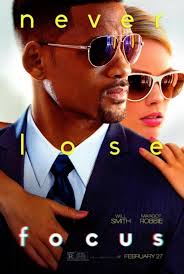
FOCUS
US, 2015, 105 minutes, Colour.
Will Smith, Margot Robbie, Rodrigo Santoro, Gerard Mc Raney, Adrian Martinez, Brennan Brown, B.D. Wong, Robert Taylor.
Directed by John Requa, Glenn Ficara.
There is often something very attractive about con men and women and fraud stories on screen, the type of characters involved, their motivations, their abilities to take people in, creating fictitious stories and maintaining them. But, it is not as if we would like to encounter them in real life!
Will Smith is very smooth as Nick, consummate charming con man, who lets himself initially be taken in, it seems, by a very attractive young woman, Jess, Margot Robbie. But, when she and an accomplice attempt to blackmail him for being in a compromising situation, he turns the tables and points out how completely ineffective they are. Jess seems to be intrigued and contacts Nick and persuades him to take her on as an apprentice.
The centrepiece of the early part of the film takes place in New Orleans during the Superbowl, Nick having a squad of 30 people, involved in all kinds of tricks, deceits, and common pickpocketing, as well as those at the headquarters who count the money, package it and deliver it. There is a lengthy intriguing episode at the Superbowl when Nick and Jess encounter a wealthy Chinese businessman, B.D. Wong. They keep betting about play moves with double or nothing, until the stakes are in the millions, Nick steadily betting, Jess rather bewildered until it all becomes clear to her and to us as Nick explains his success.
Move to 3 years later, move to Argentina, after Nick has let Jess go. Nick is involved in a confidence trick dealing with formulas and engines for motor racing, employed by a millionaire, Rodrigo Santoro, who has a bullish bodyguard, Gerald Mc Raney. And then he meets Jess just as he is preparing to set up an Australian entrepreneur, Robert Taylor with as flat an accent as you could wish or not wish. Jess seems to be with the Argentinian but succumbs to Nick’s attentions – which may or may not be setups.
There is a bit of melodrama before the end, Jess abducted, Nick in trouble – and then, a strange twist which strains credibility, and all is well (not necessarily good or moral).
This is mainly glossy entertainment for a night out.
1. Popular entertainment? Confidence tricksters? Types, the scams? The glossy treatment? The world of the wealthy? The International tone? The cast?
2. The title, Nick and his explanation? In action in New Orleans? 30 people involved, the celebration, the details of all the pickpocketing, the collection of the money?
3. Audience attitude towards Nick, towards Jess? Interest, sympathy? The amoral behaviour, greed, risk and gambling?
4. Nick, the opening, Jess and the alleged affair, the confidence trick, the husband, their being exposed? Nick’s interest in Jess? Her meeting him, requests, the discussions, the training, correcting, on-the-job, success? Participation in New Orleans? The cash, the various personalities and their functions, the supervisor, the drivers, the fat participant?
5. The Superbowl, Nick and the challenge of the Chinese gentleman, the bets and the risks, double or nothing, setting up Jess, with the binoculars, her seeing the fat man? Nick and his explanation of the brainwashing for the number, 55? Jess, out of the car with 80,000? Her reaction?
6. Three years later, Argentina, racing cars, the owner and his bodyguard, the plans, the selling of the information, for millions? Mc Ewan – and his Australian attitude?
7. The party, meeting Jess, his plan in pretending to be drunk, water instead of vodka, his reaction to Jess, drinking, his performance, the approach, the contract?
8. Jess, seeing Nick, talking, the gift of the necklace, meeting the fat man, the sexual encounter, the bodyguard and his visit to the apartment, her hiding on the ledge?
9. The irony of Nick selling the information to all the teams, the bag of cash, the car crash, their being taken?
10. The explanation? The con on Jess? Escape planned?
11. The irony of the twist, the bodyguard being Nick’s father, the tradition of tricks, his working for the Argentinian for years? The credibility of this twist?
12. The issue of who was conning whom? And the film conning the audience?
Big Eyes
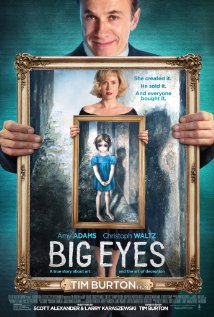
BIG EYES
US, 2014, 106 minutes, Colour.
Amy Adams, Christophe Waltz, Krysten Ritter, Jason Schwartzman, Danny Huston, Terence Stamp, Jon Polito, Delaney Raye, Madeleine Arthur.
Directed by Tim Burton.
There are quite a number of big eyes in this film. They are the focus of most of the paintings by Margaret Keane, who began her work in in the late 1950s and is still painting. She has done a series of pictures of waifs and given them all very big eyes, different colours but a pervading sense of black and darkness around them. They have been very popular over the decades while some of the art critics have dismissed them as kitsch.
It is a surprise to find that this is a Tim Burton film. For more than a quarter of a century, Burton has delivered a wide range of films treating the world of fantasy and vivid, often dark, imagination. While the big eyes do fit into this Burton interest, and there are some moments when Margaret Keane looks into a mirror and sees herself with big eyes, this is a fairly straightforward narrative, often very serious, but with some moments of hilarity and even zany bravado.
We might ask how this could be especially when the film opens with Margaret leaving home with a young daughter, driving away from the outer suburbs of Northern California into San Francisco and establishing herself there, interviewing for a job at a furniture factory, painting children’s illustrations on some of that furniture. But she does go outside, offering to paint portraits of passers-by. It is there that she attracts the attention of Walter Keane who is flirting with passers-by, trying to sell his paintings of Montmartre and other Paris settings. They connect, date, marry and go on a colourful honeymoon to Hawaii. Who could ask for anything more?
Margaret’s difficulty is that she does not know Walter very well – nor do we. At first he seems too good to be true but when he starts exhibiting his own and Margaret’s paintings in the corridor of a club which leads to the toilet and eventually does get some interest, it is in her paintings and not his. Uproar with the club owner brings headlines and photos.Walter makes friends with a San Francisco columnist and users story finds him. Margaret is dismayed when he claims that he did the paintings himself but, in those days, even with a confession sequence, although she is not a Catholic, where she is reminded that the husband is the head of the family, she continues to lie about the paintings to her daughter who is growing up and lets Walter take the credit for the fast-selling paintings. He even set up his own gallery, prints off posters which eager patrons want with an autograph, and then postcards of the posters.
This means that Margaret’s time and energy is devoted to work in her studio, churning out big eyes paintings. Walter even gets a commission for a painting for the 1964 World Fair in New York.
When Walter takes to fisticuffs against a critic at a society do, it is the beginning of the end.
The intriguing latter part of the film is the court case when Margaret sues Walter and a newspaper company and she and he, each has to prove that they are the artists who have made the big eyes pictures.
This would be an entertainment if it were not true. However, it is a true story.
Bringing it to life is the performance, intense but restrained, of Amy Adams as Margaret. But it is Walter who holds the limelight on screen, even as he did in real life. This is a cheerfully bombastic, sometimes over-the-top, performance from Christophe Waltz, which reaches its climax in his attempts to speak for himself in court and in his comically absurd self-defence.
In the final credits there is a photo of the real Margaret Keane along with Amy Adams.
1. A true story? The final image of Margaret and Amy Adams? The information at the final credits?
2. California, the late 1950s, into the 1960s? Homes, suburbs, apartments, mansions? Art galleries, studios, exhibitions? The World Fair of 1964? New York? Hawaii locations, honeymoon, the courts? The musical score?
3. Tim Burton, his work, his interest in fantasy, this film more realistic?
4. Margaret and taking her daughter, fleeing her husband, San Francisco, the meeting with Dee Ann and, support, settling, the interview at the furniture factory, with a group of people painting on the cribs and other furniture?
5. Painting outside, small cash for her portraits, next to Walter, his painting, flirting with the girls? Looking at her paintings, intrigued? Praise, misreading Margaret’s daughter, the effect? Sharing with Walter, going out, meals, the proposal, her hopes? The joy of the Hawaiian honeymoon?
6. The title, the pictures, waifs, the enlarged eyes, the pathos? Margaret and her talking of expressing emotion? The range of portraits? Using her daughter? Over the years, in her studio, secretly? The plan for the World Fair, her large mural with so many children? The impact on viewers, some liking, some disliking? The art critic considering it kitsch?
7. Walter, his character, living in a world of fantasy, stories about studying in Paris, his real estate work, his dreams of being a painter? The range of paintings of Paris and his selling them? Margaret scraping off his signature and finding the true signature, his not being a painter?
8. Walter at the club, free drinks, paintings, the decision to hire the corridor, the reaction of the owner, the various clients on the way to the toilet, not selling many pictures, his attack on the owner, their fight, photographed, in the paper, the owner and his being pleased with having a full clientele? His claiming to be the artist? Margaret hearing him, puzzling about his lying, the effect on Margaret, her actually agreeing to the paintings and letting him sign? His demands on her? The secrecy? Hiding everything from Jane, not allowing her into the studio?
9. Margaret’s will confession, not being Catholic, the priest welcoming her, talking about lying, talking about Walter, the priest’s probing questions, but then urging her to be subservient to Walter for the sake of peace and the family?
10. Walter, selling the paintings, bringing home the cash? The decision to open the gallery? His rival with Ruben, Ruben and his gallery across the street, dismissing Walter’s paintings? The exhibition, the interests, the range of people present, the focus on Margaret’s paintings? The effect on her?
11. Money making, people unable to afford the pictures, buying the posters, the autographs, then making postcards?
12. The passing of years, the pressure on Margaret, her daughter growing up?
13. The prospect of the World Fair, Walter’s proposal, the acceptance, Margaret doing the painting, weary, her daughter finding her exhausted?
14. The art critic, supercilious, his critique, dismissing the paintings as kitsch? Walter’s reaction outburst, the fight at the party? The articles condemning him? The World Fair withdrawing the painting?
15. The San Francisco journalist, his narrative, his writing his column, human interest stories, listening to Walter, becoming a friend, believing him, helping him? The discovery of the truth and his reaction?
16. Walter, his enjoying society, his reputation, signing the paintings, everything going to his head, increasing the fantasy, saying that women could never sell their paintings? The clashes with Margaret?
17. Margaret, the final confrontation, taking Jane, going to Hawaii?
18. The year passing, the decision about anonymity? Suing Walter? Suing the papers? The courting Hawaii, Walter’s reaction? His bravura behaviour?
19. The judge, the jury, his sympathetic response, criticising Walter and his self-defence? The idea that each of them should take an hour to paint? Or to saying he wanted inspiration, his shoulder hurting, not painting? Margaret painting, with her daughter, winning, the press conferences? Her reputation?
20. The aftermath, Walter and his denials, dying in 2003, never doing any more painting? Margaret, her continuing to paint every day?
21. An interesting film about after talent, fantasy? Hoaxes and frauds in the art world?
Second Best Exotic Marigold Hotel, The
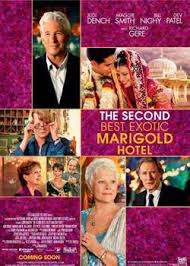
THE SECOND BEST EXOTIC MARIGOLD HOTEL
UK/US, 2015, 122 minutes, Colour.
Dev Patel, Maggie Smith, Judi Dench, Richard Gere, Bill Nighy, Celia Imrie, Ronald Pickup, Diana Hardcastle, Penelope Wilton, Tamsin Greig, Tina Desai, Shazad Latif.
Directed by John Madden.
No, not second best - rather, the accident is on ‘second’. Since we all know all about the first Best Exotic Marigold Hotel, and enjoyed the film, liked the characters, appreciated the exotic atmosphere in India, it is fairly obvious that we would like a second.
Most of the team are back again, except Tom Wilkinson whose character died in the first film. Most of them are ensconced comfortably in India, and, in the Hotel, although, it is emphasised, there is a roll call each morning just to make sure that everyone is still there!
Actually, the film opens in the United States, with Mrs Donnelly and Sonny driving through California, he exuberant behind the wheel, she her usual dry-commenting self. Dev Patel and Maggie Smith. They are full of enterprise, wanting to interview the board of a hotel company with the idea of opening the second hotel in Jaipur although the Americans don’t share the basic idea of retiring to India for final years and death. But they agree to send an agent to check out how the hotel is run.
Meanwhile, back in Jaipur and the oldies! Ronald Pickup’s Norman and Celia Imrie’s Madge are at work at the British club (also watering the drinks), Norman, less flirtatious, in a relationship with Carol, and Madge with the dilemma of having two local suitors. Judi Dench’s Evelyn is still working, though she mentions in passing that she is 79 – which was her actual age at the time of filming – and is checking out fabrics with local merchants, being offered a job from an international company and going to Mumbai with the local merchant for further development. Bill Nighy’s Douglas, separated from his hen-packing wife, Jean (Penelope Wilton) is taking tourists for visits to local shrines, but with his failing memory relies on an ear-piece with a young boy feeding him the information, although at one stage he rushes off to play football with his friends forgetting his duties. Actually Jean does come to India, as she says, to visit the old ruins but also to see how everyone is getting on! She has her own sad story but is happy that her daughter is coming to India to give a talk at a conference.
As for Sonny, he is busy, busy, busy, preparing for the engagement and his wedding, while his fiancée, Saina, is also busy at the hotel reception desk. Then there is his mother whom he rather keeps in check.
There are preparations for the engagement, preparations for the wedding – and, of course, a song-and-dance most colourful wedding ceremony.
But, there is still some intrigue when Richard Gere turns up and is considered the agent for inspection, even though he tells the story that he has come to write a novel. The novel turns into a real life novel as he is attracted to Sonny’s mother which does not please Sonny. Most of the staff, however, consider another visitor (Tamsin Grieg) who says she has come to look out for a place for mother as the agent. Lots of kowtowing on Sonny’s part, visits to prospective hotels, and complications and jealousies when an old friend puts in a bid for a hotel and spends a lot of time coaching Sonny’s fiancee in dancing for the celebrations.
All is well, finally, with Mrs Donnelly talking some common sense into Sonny.
This sequel has attracted large audiences and big business – but, the surprise of the first film can never be repeated and watching this film seems something akin to having a large second helping of dessert.
1. The popularity of the original, story, themes, characters, India and its atmosphere?
2. This film, more of the same – plus?
3. The introduction to the film in the United States, San Diego, Mrs Donnelly and Sony driving through the US, his exhilaration? The meeting with the hotel people, Mrs Donnelly and the proposal, Sonny and his enthusiastic contribution? The Skype message from his fiancee, the plans for the wedding, the dance rehearsals, the steps, her friend, Kushal, and Sonny and the beginning of his jealousy?
4. The city of Jaipur, the old classic buildings, the streets, hotels, atmosphere, modern? Remnants of the colonial atmosphere? The world of the ordinary citizens of the city, markets, shops, ordinary homes? The musical score?
5. The basic idea of the films, the elderly choosing to die in India after living the rest of their lives? The hotel, the roll call every day and Sonny giving the reasons? Taking the idea to the United States, Evergreen and its different perspective? The decision to send inspectors? The end and the CEO visiting India and meeting Mrs Donnelly?
6. The plans, a new hotel, inspectors, the arrival of Guy, the arrival of Teresa, the airport, both coming to the hotel, her different name? The rooms, Sonny and his overdoing the treatment for Guy, trying to make an impression, less so for Teresa? The change of rooms without his knowledge?
7. The captions for the film: the engagement, the family party, the wedding? The importance of costumes, the elaborate celebrations?
8. Sonny and Saina, friends for a long time, the Skype contact in San Diego, the dance, the presence of Kushal? Their work at the hotel, each of their jobs, management, Saina and reception? Jealousy, suspicions, self-pity, Saina’s reaction?
9. The possible second hotel, the visit, taking Guy and Teresa? Kushal and his offer to buy the hotel? Later taking over the established hotel and celebrating the wedding?
10. Evelyn, her life in England, the change in India, the work, 79 years of age? The skill with the fabrics, the bargains at the shop, the visitor from England, the offer of the job, her acceptance? Going to Mumbai, on the train, taking the merchant from the market, the huge factory, the fabrics, the insults in Hindi, her reading out the words indicating that she understood, getting the bargain? Staying with the man’s cousin? Going to the lecture, meeting Laura? Her relationship with Douglas, the attraction, wanting time, the return to the wedding, his speech and the earpiece, her final words to him, finding love?
11. Douglas, his life, separation from Jean, enjoying India, his work as a tour guide, his forgetfulness, the student with the earpiece, going to play football? His bike, the repairs? Jean’s arrival, his being uncomfortable, her conditions for a divorce, Laura and her talk in Mumbai? His return, the speech of the wedding, the earpiece and Evelyn’s words?
12. Jean, her dislike of India, separating from Douglas, her daughter, coming to India, insults, implications of Douglas having an affair with Evelyn? Her pride in her daughter, the talk? The discussions with Evelyn, Evelyn realising the truth about Jean’s boss and her talk about a proposal?
13. Norman, his background, the old roue, the relationship with Carol, the drinks and watering them down, at the club? Love for Carol, following her to work, seeing her with the other man, being edgy, the taxis and his drinking, the money, thinking that his driver had attacked Jean – going to the company and finding all the drivers? And the scorpion sign on the taxis? His confession to Carol, her response?
14. Madge, her background, her response to sexiness? Working at the club, watering the drinks? The driver, the two men wanting to propose to her, visits with each? Meeting the driver’s niece, at the Doctor with Mrs Donnelly, the niece wanting to look at the book, her bringing the gift of the ballerina dancing, with the driver, the choice between the two men and her choosing the driver?
15. Guy, the presence of Richard Gere, his allegedly writing the book, his story, divorce, breakdown? Sonny and kowtowing to him, the change of rooms, the tours? Guy and his attraction to Sonny’s mother, the drinks, talk, the sexual encounter and Sonny arriving, confronting his mother? The unmasking of the
identities? Guy’s leaving, resigning from his job, going to write the book, staying with Sonny’s mother?
16. Teresa, her visit, as an inspector for the rival company, the story about her mother, reaction to Guy, the change of rooms, unmasked, succumbing to the atmosphere?
17. Sonny and his mother, at the hotel, severe with his mother, her rousing on him? His visit with Saina’s parents, his promises? Preparation for the wedding, Kushal offering to be a partner, Sonny upset, Mrs Donnelly giving him a dressing down about self-pity? His change?
18. The celebration of the wedding, the dancing, the music, everybody involved? Mrs Donnelly and her return to the hotel, writing the letter, urging on Sonny, reflections on her simple life, the final times in India, the visit from the CEO from America? Dying?
19. Happy ending, the celebrations, the partners on their bikes?
20. A film for older audiences, about joy in life and in older age?
Manny Lewis
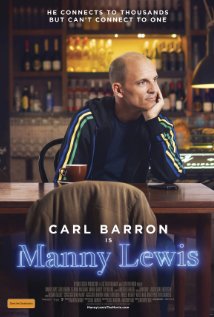
MANNY LEWIS
Australia, 2015, 95 minutes, Colour.
Carl Barron, Leeanna Walsman, Roy Billing, Damien Garvey.
Directed by Anthony Mir.
This is a small Australian film which deserves being seen quite widely.
This reviewer was not familiar with the work of Carl Barron, a stand-up comedian who began his working career as a labourer and moved into comedy. He has written the screenplay for this film with his colleague, director Anthony Mir, and plays the part of a fictional stand-up comedian, Manny Lewis. Carl Barron invests a great deal of intensive energy into his portrayal of Manny Lewis which inevitably raises the question how much of this film is autobiographical.
The first few moments are not quite auspicious, some examples of stand-up comedy, heard behind the credits. Not particularly funny – despite the laugh-track sounding quite hearty and rather morbid in subject.
However, as we get to know Manny Lewis, he is not the kind of person we would find enjoyable company but he is the kind of person whose screen story becomes more interesting and intriguing. He is middle-aged, unmarried, has a difficult relationship with his father whom he drives out to the country to visit now and again. He does not mingle at parties despite all the liveliness around him. He is in constant touch with his agent, played with some exuberance as well as melancholy, by Damien Garvey. There is one bright prospect, the possibility of a tour of the United States.
When Manny goes home after a party to his unit, looking out on Sydney Harbour and the Bridge, his loneliness overcomes him and looks up the phone book for phone-sex numbers. After hanging up, he dials again and is referred to Caroline who speaks with an affected sex-husky voice. The first contact is a mixed success and he will dial again and again.
In the meantime, the audience learns more than Manny does. Caroline is actually Maria, a young woman, from Gympie, making ends meet by the phone work, intending to sail to Brazil, an attractive performance from Leeanna Wiseman. By accident, she sees an interview with Manny on television and sets herself up to meet him by chance.
No one can say that Manny Lewis is not predictable. It is, even to the final fadeout. But that does not matter, because the film becomes sweeter and nicer as it goes on and, unless an audience has excised sentiment, they will find it a pleasant film.
Of course, Manny enjoys Maria’s company, the possibility for talking, going out, being himself – but, he confides more and more in Caroline, even telling her some of the mannerisms that he finds irritating in Maria! Maria does her best. Inevitably, the truth comes out with sadness for each of them.
Manny has to perform at the State Theatre in Sydney, to a very enthusiastic audience, stories and jokes about life, death and loneliness, as well as some songs, the lyrics of one relating to his experience with Maria.
The show is a success and the American producer wants him to sign a contract. His dad has come to the performance and is instrumental in apologising to his son for his harshness in the past and urging him, telling the story of his falling in love with his mother, to do the right thing.
It is almost hit and miss as Maria is on the boat for Brazil, but… (Nobody said that the film was not predictable, pleasantly so).
1. The story of a sad comic? Australian setting?
2. The Sydney locations, life at King’s Cross, the harbour, the Bridge, the Opera House?
3. The songs, Manny’s songs and the lyrics and themes? The musical score?
4. The title, the focus, the stand-up comic, his character, life, performance, his self-image, morose, funny? Not?
5. The jokes over the credits, the nature of stand-up comedy, the nature of Manny’s jokes, themes, serious, life and death? Funny or not? The audiences and the laughter? The performances being kept to the latter part of the film, in the State Theatre, television? The excerpts?
6. Manny, Carl Barron and his input into the film, writing, performance, his own experience as a stand-up comic after doing manual work? His age, appearance, seeming nondescript, yet his performance, reputation? The TV interview? The background of his father, his relationship with his father, his father being tough, his memories? His relationship with his agent, the concern about his image, not mixing with people, drinking, bored? A purpose in life?
7. The agent, bluff and hearty, skill in management, his own family, his boy, the celebrations, drinking and Manny’s taunt about his drinking in front of his son? His feelings? The deals, the possibility of the American tour, the performance at the State Theatre, television? With the American producer, the possibility of signing the contract, Manny going off?
8. Manny’s father, his driving to see him, the visit, the old jokes, not much conversation, drinking? The later conversations? His father apologising about his treatment of his son? The father going to the performance, entering the theatre, calling out, encouraging Manny? After the performance, a contract, the serious talk, his father’s memories about his love for his wife, urging Manny to go to find Maria?
9. Manny, alone, at parties, morose, alone in his flat? The phone sex, the telephone book, his hesitation, getting through, talking with Caroline, the nature of the talk, her sexy voice, his wanting to talk more personally, the lonely man wanting her to listen? The development of the relationship?
10. Caroline, her voice, listening, responding? Seeing her at home, ordinary, seeing Manny on the television? In herself, her background from Gympie, going to Sydney, the sex phone work, going to the cafe, contacting Manny? The barman and his friendship, Brazil, wanting to go to Brazil? Loving the salsa dancing?
11. The outings with many, their talking, being together, comfortable with each other, his phoning her as Caroline, listening to his criticisms, her changing, letting her hair down…?
12. Manny, talking with Caroline, his complaints, his declarations? Her mistake in using his name? Manny realising the truth? Phoning her outside her flat? His disillusionment?
13. His being hurt, not contacting her, her decision to go to Brazil? The performance at the theatre, the American producer, the contract, his realising the truth about Maria?
14. The performance, the audience, the nature of the jokes, the song about Maria?
15. His father’s advice, hurrying to the wharf, calling out her name, finding that she had not left, her dilemma on the boat and her decision not to go? His love for her?
16. Rather nice, even a sweet screenplay, the touch of the predictable – but it not mattering because of our response to Manny and Maria?
Inherent Vice
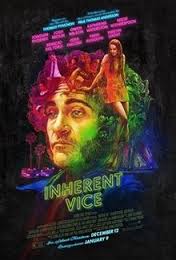
INHERENT VICE
US, 2014, 148 minutes, Colour.
Joaquin Phoenix, Josh Brolin, Jemma Newsome, Katherine Waterston, Jeannie Berlin, Eric Roberts, Serena Scott Thomas, Benicio Del Toro, Jena Malone, Martin Short, Peter Mc Robbie, Martin Donovan .
Directed by Paul Thomas Anderson.
First of all, the title. Inherent Vice for those with a religious bent might sound like an alternate description of the Reformation Theology of the inner corruption of every human being, absolutely needing God’s grace. Actually, the meaning of the title is far more mundane. As the voice-over astrologist tells us, inherent vice means anything of this nature which cannot be avoided: chocolate melting, ice melting, glass cracking… How that title applies to the situations and characters of this story is a challenge to the audience. It may mean that the central character Doc, who spends a lot of his time stoned, has that particular inherent vice as well as an innate curiosity to solve crimes.
What about Incoherent? That is not a misprint for coherent! And many audiences might offer the opinion that Incoherent would be a more truthful title.
However, when one looks at some of the Private Eye films from the past, especially from the 1940s, like The Big Sleep which most commentators say they cannot logically explain, or listening to the last five minutes of The Maltese Falcon with Humphrey Bogart giving a speed-spoken explanation of what was what, who was who and why was why which is very difficult to comprehend on first listening, then incoherent is probably a relevant word.
But this film, adapted from a novel by Thomas Pynchon by the director, Paul Thomas Anderson, who has made some impressive films over the years including Boogie Nights, Punch-drunk Love, There Will Be Blood, The Master, is not from the 1940s but, rather, from the late 1960s. No black and white here. Instead there are bright colours, a fair amount of sunlight, and re-creation of a hippie lifestyle on the California beaches of those days.
While Doc, played most effectively by Joaquin Phoenix, is no Humphrey Bogart or Dick Powell, he is in their tradition, a seedy-looking office, lots of interesting, even if shady, contacts, and a girlfriend, Shasta (Katherine Waterston) who may be a good girl or not – and some of the sex scenes later indicate that it might be “or not”. However, it is she who brings a mystery to Doc which sets him following through, getting advice from Benicio Del Toro, interviewing a man just out of prison – and finding himself waking up next to a corpse which certainly arouses police attention and suspicions. The main policeman is Bigfoot, played by Josh Brolin.
There is quite a range of cast, from Reese Witherspoon as an uptight district attorney official (except when she canoodles with Doc), a former band member who has become an undercover informant (Owen Wilson), a lewd dentist with a partiality for young women and cocaine (Martin Short) and an assortment of its citizens as well as corrupt police.
Whether the mainstream audience will respond well to this film is more than doubtful. It makes too many demands in trying to respond to the unravelling of its plot, not an immediate rapport with most of its characters, and not so much of response to these stoner times (except perhaps from those who lived through them).
The inherent vice of many of those who watch the film will be: too difficult to follow and so give up. It is a film for film buffs.
1. The meaning of the title, chocolate melts, ice melts, glass cracks? Inherent Vice meaning anything that cannot of its nature be avoided? Its application to the screenplay?
2. The late 1960s, California, the beaches, hippie lifestyle, predominance of drugs, sexual behaviour, addicts, addled memories, behaviour? Crime, the police? The Nixon era? Neo-Nazis?
3. The re-creation of the period, its look, clothes, feel?
4. The musical score, the range of songs from the period and the use, atmosphere, the lyrics commenting on characters and action?
5. Inherent, coherent, incoherent? The novel by Thomas Pynchon, the adaptation by the director? The perspectives on life, morals, right and wrong?
6. The work of the director, writing and directing, aspects of American life and society? His visual style?
7. The tradition of the Private Eye films, especially from the 1940s and film noir? This film not in noir but in bright colour? The tradition of voice-overs, narrative, comment (in this case the voice of the astrologist, feminine, the knowledge of characters, description of situations)? The clarity or non-clarity of the narrative? Of the events, of characters motivations?
8. Use of close-ups, tight focus on characters’ faces, warts and all study?
9. Joaquin Phoenix and his performance as Doc? The great tour-de-force? His name, his background, his work, his appearance, muttonchops, hair and style, curling it, sloppy clothes, his manner of speech? The relationship with Shasta, her coming to visit, memories of the past? Her description of the plot, the wealthy man, his wife and boyfriend, wanting her involvement, putting him in an institution? His disappearance, the investigative leads, Doc following up, the complexity?
10. The interview with the man out of jail, bodyguard, Doc and drug experiences, waking up beside the corpse, police suspicions?
11. Sauncho Smilax and his character, giving information, The Golden Fang, the boat, the meal, the drinks? His reappearance at the end and the discussions about the case?
12. Penny, proper and her legal work, seeing her at work, the interview with Doc, visiting later, sex and drugs? His asking her for files, her lending them? With the agents? Her work of the office?
13. Coy Harlingen, making contacts, his information, the Golden Fang, his being undercover and informant of the police, the other connections? His behaviour on television at the Nixon rally? His background in the band, his wife and family, wanting to hide, Doc doing the bargain for his freedom with Japonica’s father? Taking him home, reunited with his family?
14. The dentist, the receptionist, information, lewd sexual behaviour, the indulgence in cocaine, Doc taking advantage himself?
15. Bigfoot, his role in the police, investigations, the leads, his office, the meetings with Doc, setting him up with his partner, the cache of drugs? Doc and his escape and the shooting-deaths? The exchange of the drugs? At the end, reappearing with Doc, the two saying the same words of dialogue, his
indulgence in the drugs, legal? Meaning?
16. Shasta, her story, disappearing, reappearing, the sexual encounter with Doc, on the beach at the end?
17. Doc, wanting the files, Penny allowing it? Information about Adrian and other police? Doc going to visit Adrian, the discussions, his henchman, huge, chaining Doc, his somersault and unlocking his cuffs, the escape, the brutal treatment of the bodyguard? The garden, shooting the guard and Adrian? Bigfoot and the setup?
18. The film as a cinematic experience, the times, as a private investigation mystery in the tradition? The detail being unclear in some of those films? Late 1960s fashion? With Shasta? In the car, the police? The later news of his death?